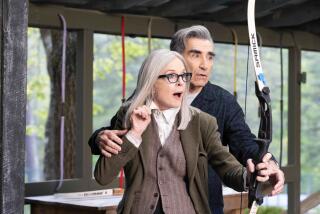A Disc Jockey’s Notes on Camp
- Share via
Webster’s defines “camp” as “something so outrageously artificial, affected, inappropriate, or out-of-date as to be considered amusing.” But for disc jockey Chris Fabbro, host of KXLU radio’s weekly “Camp Stop the World” show, camp is a world view. Once a writer in Warner Bros. TV’s international marketing department, Fabbro now is an Inyo National Forest employee on fire-lookout duty who commutes to L.A. to broadcast from the Loyola Marymount campus, plumbing his vast collection of LPs for “historical ‘n’ hysterical” nuggets ranging from Eartha Kitt to Phyllis Diller to the soundtrack from the 1970s kiddie-TV program “Zoom.”
When is a record right for your show?
Is it out of style? Is it about to go out of style? Are you embarrassed to admit to your friends that you dance around to this stuff? It’s anything that might make a person roll their eyes, or make their ears prick up in excitement. It has to have lost its luster. I wouldn’t play any of the boy bands right now. But in a couple of years . . .
What makes camp camp?
I can only go on what makes me giggle. I use the word “giggle” because if you were to say “snicker,” it wouldn’t necessarily be camp. It’s about art and beauty being in the eye of the beholder.
But there are things that everyone could agree on.
Everybody would agree that early John Waters films are campy, and Donna Summer is a pop legend. Anything that once might have had some legitimacy, that now few people legitimize. Is camp a philosophy of life?
If you look at drag from the ‘50s and ‘60s, it was a rebellion. Back then, drag queens were serious about changing the world and upsetting everybody’s ways of thinking. We forget that anything that makes us laugh isn’t just a tension release--sometimes it’s hard-core therapy. Drag now [isn’t] so much about statements; it’s about having fun.
Why was camp originally associated with gay men?
When times were much more oppressive, people needed an outlet of expression, and camp was one of the few legal ways to do that. When you consider it was illegal to hold hands or kiss, let alone live like spouses, there had to be ways your working stiffs and your poets and your philosophers could express themselves.
What’s your most-requested song?
One is “He’d Rather Be a Girl,” by Ruth Wallis. The other is called “Why Me, God?” by Modine Gunch, but everyone calls it by its refrain, which you can’t print. The rest are early ‘80s soundtrack songs, like “Nine to Five.”
Was there a camp epiphany that changed your life?
Much to my chagrin, in a group setting, I always laugh at things that nobody else is laughing at. And it’s always been like that. I don’t know why I have this skewed view of the world. I remember once I was with my parents [at] a play, and during intermission I said, “I’m sorry that I’m laughing when nobody else is laughing.” My mother said, “Maybe learn to laugh more to yourself.” [But] my father was like, “The hell with that. Laugh!”
What can camp teach us?
That question is campy.
More to Read
The complete guide to home viewing
Get Screen Gab for everything about the TV shows and streaming movies everyone’s talking about.
You may occasionally receive promotional content from the Los Angeles Times.






